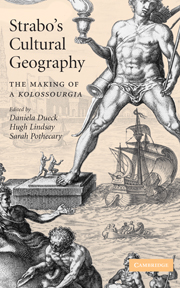Book contents
- Frontmatter
- Contents
- List of maps
- List of illustrations
- List of tables
- List of figures
- List of contributors
- Acknowledgements
- List of abbreviations
- Introduction
- 1 Kolossourgia. ‘A colossal statue of a work’
- 2 Reflections of philosophy: Strabo and geographical sources
- 3 Who is a barbarian? The barbarians in the ethnological and cultural taxonomies of Strabo
- 4 Gender at the crossroads of empire: locating women in Strabo's Geography
- 5 Strabo and Homer: a chapter in cultural history
- 6 Strabo's use of poetry
- 7 Strabo's sources in the light of a tale
- 8 The foundation of Greek colonies and their main features in Strabo: a portrayal lacking homogeneity?
- 9 Ανδρες ἔνδοξοι or ‘men of high reputation’ in Strabo's Geography
- 10 Comparing Strabo with Pausanias: Greece in context vs. Greece in depth
- 11 The European provinces: Strabo as evidence
- 12 Amasya and Strabo's patria in Pontus
- 13 Cappadocia through Strabo's eyes
- 14 Greek geography and Roman empire: the transformation of tradition in Strabo's Euxine
- 15 Josephus' hidden dialogue with Strabo
- 16 Temporal layers within Strabo's description of Coele Syria, Phoenicia and Judaea
- Bibliography
- Index of geographical names
- Index of personal names
6 - Strabo's use of poetry
Published online by Cambridge University Press: 18 December 2009
- Frontmatter
- Contents
- List of maps
- List of illustrations
- List of tables
- List of figures
- List of contributors
- Acknowledgements
- List of abbreviations
- Introduction
- 1 Kolossourgia. ‘A colossal statue of a work’
- 2 Reflections of philosophy: Strabo and geographical sources
- 3 Who is a barbarian? The barbarians in the ethnological and cultural taxonomies of Strabo
- 4 Gender at the crossroads of empire: locating women in Strabo's Geography
- 5 Strabo and Homer: a chapter in cultural history
- 6 Strabo's use of poetry
- 7 Strabo's sources in the light of a tale
- 8 The foundation of Greek colonies and their main features in Strabo: a portrayal lacking homogeneity?
- 9 Ανδρες ἔνδοξοι or ‘men of high reputation’ in Strabo's Geography
- 10 Comparing Strabo with Pausanias: Greece in context vs. Greece in depth
- 11 The European provinces: Strabo as evidence
- 12 Amasya and Strabo's patria in Pontus
- 13 Cappadocia through Strabo's eyes
- 14 Greek geography and Roman empire: the transformation of tradition in Strabo's Euxine
- 15 Josephus' hidden dialogue with Strabo
- 16 Temporal layers within Strabo's description of Coele Syria, Phoenicia and Judaea
- Bibliography
- Index of geographical names
- Index of personal names
Summary
The study of an author's sources throws light not only on the act of compiling information; it is also relevant for other issues pertaining to various aspects of the development and existence of an intellectual society. First, it is a reflection of the author's literacy. Second, it indicates norms of education among the readers. Third, it may imply the scholarly tastes of the society in which the work was composed.
Strabo's voluminous work required extensive use of many informants, particularly because his proposed task was very broad in three senses: geographically – it aimed at encompassing the entire oikoumene; chronologically – although focusing on the current situation of his world, Strabo included much information on past situations in order to explain the present; thematically – in the best tradition of Greek descriptive geography, the work referred to many aspects of life in each region such as botany, zoology, history, ethnography and topography. All these tendencies resulted in Strabo's encyclopaedic Geography which is based on hundreds of pieces of information.
The examination of Strabo's sources should not be limited to a mere listing of these authorities, although such a compilation may be illuminating in itself, at least in regard to the number of different sources, their variety and their chronological distribution relative to Strabo's own time. A further step would be an assessment of the nature of Strabo's use of these sources, whether as informants of facts otherwise unknown, as support to other pieces of information or as servants fulfilling other goals of the author.
- Type
- Chapter
- Information
- Strabo's Cultural GeographyThe Making of a Kolossourgia, pp. 86 - 107Publisher: Cambridge University PressPrint publication year: 2005
- 2
- Cited by



